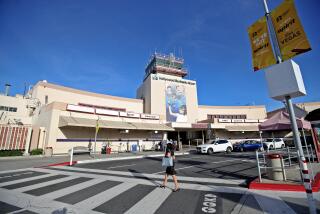3 Months After Ill Woman Vanishes, Mystery Deepens
- Share via
Joe Dabney is not doing so well. Slumped in his wheelchair, he gazes into the closet of his Bakersfield apartment, a bare bulb illuminating two lonely shirts. There’s a boxed tinsel tree that never made it out for Christmas.
Then he points to the suitcases.
After three months, he still cannot bear to open them. His wife was the last to close them, the morning she vanished.
Margie Dabney at 70 suffers from Alzheimer’s disease and is lost in America--most likely Dallas-Fort Worth, but who can say?
An American Airlines attendant assigned to get the couple to their connecting gate failed to keep track of her, her family says. The airline says the wheelchair aide may not have realized he was responsible for both Dabneys, nor that Margie had Alzheimer’s.
And so Margie Dabney, like millions of Americans with Alzheimer’s disease, wandered away.
Once police at Dallas-Fort Worth International Airport joined the case, they made an assumption that Alzheimer’s advocates fear will prove lethal: that officers would find the missing woman on their own.
Margie Dabney vanished after her plane landed about 10 a.m. Wednesday, Dec. 5. The airport did not contact reporters until late Friday, when local TV stations broadcast her picture.
“The first two hours are critical,” said Brian Hance of the national Alzheimer’s Assn., who runs its Safe Return program. “Nearly 60% of people with Alzheimer’s will wander at some point in the progression of the disease. If they’re not found within 24 hours, at least 46% may die, normally succumbing to hypothermia or dehydration.”
An estimated 4 million Americans are afflicted with the disease that progressively robs all memory. By the year 2050, that number is expected to grow to 14 million.
Since Margie Dabney’s disappearance, the Dallas-Fort Worth Airport’s 18,000 acres have been searched by ground and air. Hospital psychiatric wards, churches, truck stops and morgues have been checked. Activists who do a monthly homeless count on the streets of Dallas circulated more than 5,000 fliers seeking information on her whereabouts. American Airlines hired a private investigator who remains on the case. So far, not a trace.
Much is disputed about this doomed journey by a poor couple, who struggled with aging and completely relied on each other. But this much is agreed upon: Margie Louis Dabney is a 95-pound African American woman who takes medication for high blood pressure and diabetes. She and her husband were flying from Indianapolis to Los Angeles, with a plane change in Dallas. A flight attendant delivered them to a wheelchair aide at Gate 35 to escort them to Gate 39, and Margie Dabney never got there.
“Poof! This woman is gone,” said Cherry Hogan, family assistance coordinator for the Dallas chapter of the Alzheimer’s Assn., whose mother succumbed to the disease last fall.
“That airport is like a city. Trains underground. Buses going everywhere. There are whole lines of taxis sitting outside. Did someone usher her into a cab? Is she inside that airport still?”
Questions Linger as Search Winds Down
As the formal search winds down for lack of leads, disturbing questions linger:
Should the airline, which typically places a “special needs” badge around such a passenger’s neck, have done more to inform the attendant?
Should the airport police department have been better prepared to handle the very common problem of wandering by the memory-impaired? Should they have alerted the media sooner?
And finally, should Joe Dabney--who says he had an ugly argument with the attendant to ignore the wheelchair and keep track of his wife--have better conveyed her tendency to wander off?
The airline says Margie Dabney boarded the plane with a special needs badge, but airline staff could find no one who recalls seeing her wearing it when she got off the aircraft in Dallas. American says Joe Dabney only mentioned his wife’s Alzheimer’s to the attendant after she failed to emerge from a restroom.
Margie Dabney wore no medical ID bracelet. She had once been lost for three days in Bakersfield after she wandered away from a Greyhound bus depot while Joe used the restroom. And her wandering was the whole reason for her trip to Indiana, so that family members could watch over her while Joe Dabney had hip surgery.
But Margie Dabney slipped out of her daughter’s house and went to a nearby hospital in search of Joe, he said. His daughter, he said, felt forced to lock her mother inside the house whenever she had to work.
Joe and Margie have been married 34 years. They have 10 children, two of their own and eight from Margie’s previous marriage. The children are scattered in various states and had jobs that prevented them from staying home with their mother constantly. Joe Dabney, a cab driver, has suffered from pain ever since a bad traffic accident.
But he had his memory, he figured, and Margie could walk and push him. As long as they stuck together, he thought, things would be all right. But now she’s gone.
“All I want is my wife. She really was the only woman I ever loved,” Joe Dabney said, bowing his head. “I just want to know that she’s OK, what happened.”
Memory-impaired people like Margie Dabney who wander usually do so chronically, and for very personal reasons. Relatives and caregivers of Alzheimer’s patients say they wander in search of a self they recognize, an accomplished self who was once a doctor or teacher or stay-at-home mom.
“They set out for their childhood home, somewhere in their memory where they lived in a . . . place where they felt normal and safe and happy,” said Hance of the Safe Return program.
For $40, any memory-impaired person can be registered in the program through the Alzheimer’s Assn. at https://www.alz.org or (888) 572-8566. A bracelet or necklace will identify the person, their memory problem and a 24-hour toll-free number for Safe Return. Local police and media are swiftly contacted.
Margie Dabney fit the pattern of the typical Alzheimer’s wanderer. She sought out hospitals, where she would insistently ask for her husband or her mother, who died in 2000, Joe Dabney said. That was about the time he realized his wife was not herself.
On Dec. 5, the Dabneys’ flight landed in Dallas around 10:15 a.m. Normally Margie would push Joe’s wheelchair, but the attendant took over, he said.
The airline maintains that the attendant escorted Joe Dabney to the restroom at his request and that Margie Dabney went into the women’s facility. When she did not come out, the attendant sent in a female aide, who could not locate her. She was reported missing at the gate and, after a search by airline personnel of other gates and restrooms failed to find her, airport police were alerted.
American Airlines contacted police 75 minutes after Margie Dabney landed because it thought she would be found, said airport spokesman Ken Capps.
“I do want the airlines to speak about the airlines, but what happened on the hand-off between the airplane and the gate agent is the critical point,” Capps said. “What I have said several times is that the airport did not lose Mrs. Dabney, but the airport has tried valiantly to find her.”
Joe Dabney blames all of them for losing his wife. So does his daughter Candace Price. She has spent weeks in Dallas, shuffling to and from Indianapolis so she can hunt for her mother. She is a long-haul truck driver who keeps hoping to get a Texas job until her mom is found.
“These people have no idea what this has done to my family,” Price said, steering a big rig one night through Waco, Texas. “I didn’t pay my car note at Christmastime so I could afford to fly down the first time. By then, they had put my poor father on a plane and flown him home without my mom.”
Even this is disputed. On Dec. 5 Joe Dabney had no money and no help, and he was cussing mad. Dabney said he got rolled onto a 3 p.m. flight back to Los Angeles and could do little about it but sob the whole way. He had to catch a Greyhound for Bakersfield after that.
“I was a fool to let them put me on that plane, wasn’t I?” Dabney said.
American spokeswoman Andrea Rader argued that other Dabney relatives said it was OK to put him on the L.A.-bound plane and that American offered him a free flight back to Texas.
“It came to be time to say, ‘Look, there’s not much more we can do for you here, Mr. Dabney,’ ” Rader explained. “Mr. Dabney became agitated with that.”
American Airlines extended other offers to family for free tickets to and from Dallas as the search wore on.
Does the world’s largest airline take any responsibility for losing this passenger?
“That’s a tough question to answer,” Rader said late last month, “because there’s a lot of nuances to it, and a lot of things we just don’t know at this stage of things. Our actions certainly say that this was a terrible thing that happened to one of our customers, that we really pulled out the stops.”
And the airport? Does it take any responsibility?
“We feel quite comfortable in our efforts in this case,” spokesman Capps said, adding that the airport police will be undergoing training by the local Alzheimer’s Assn. on how to respond when a memory-impaired person goes missing.
Candace Price won’t be moving on, not yet.
“I’ve talked it over with my husband, and we decided it’s best for me to stay here,” Price said. “I cannot leave here without her.”
More to Read
Sign up for Essential California
The most important California stories and recommendations in your inbox every morning.
You may occasionally receive promotional content from the Los Angeles Times.













